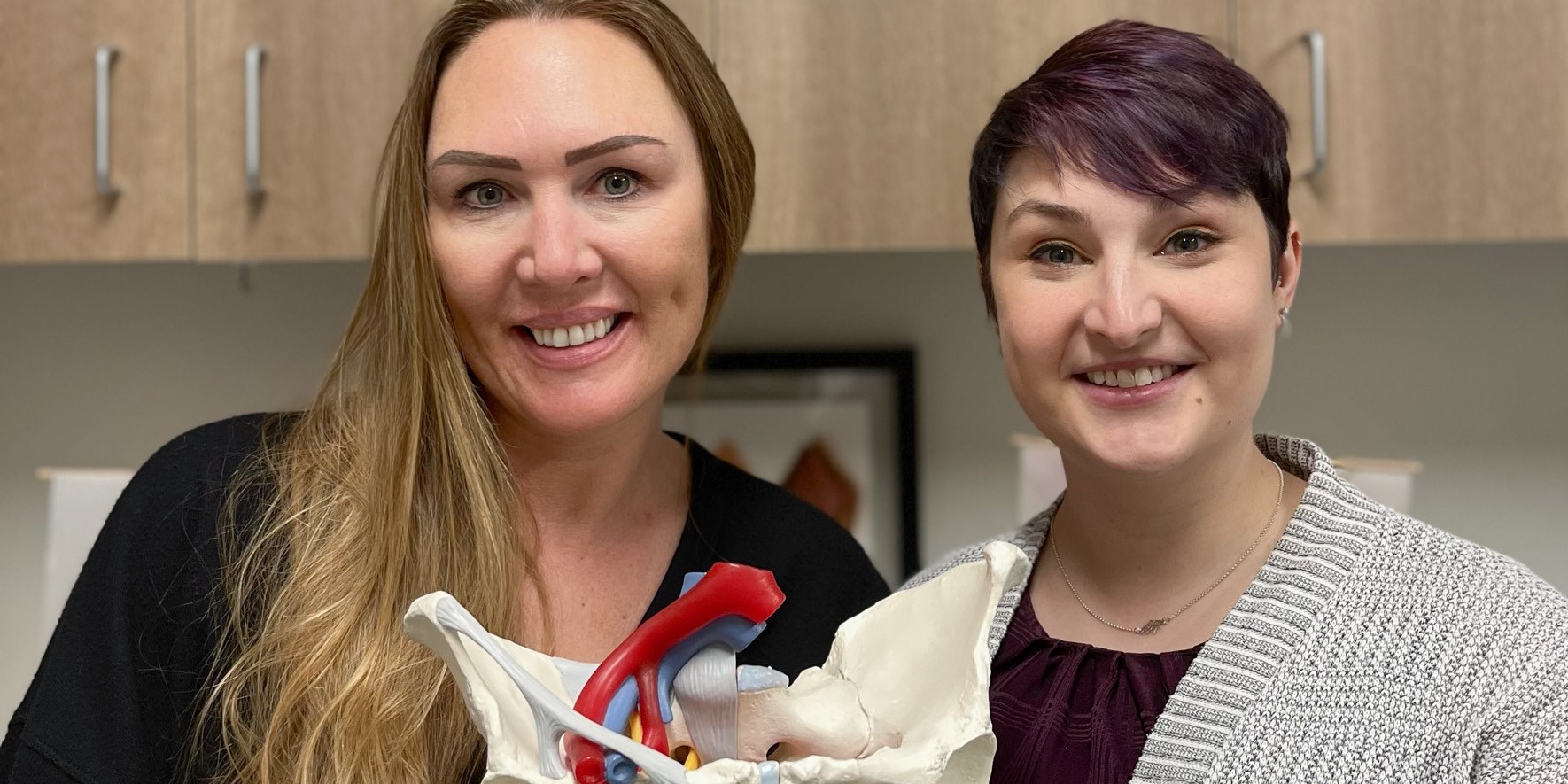
Each profession has its own code of ethics to give guidelines for the professional to act. This is the case for lawyers, doctors, mental health therapists, massage therapists, and accountants to name a few. In pelvic rehabilitation, the APTA and AOTA make different guidelines for physical therapists and occupational therapists respectively.
For physical therapists, the Code of Ethics is built upon the physical therapist's five roles, the profession's core values, and the multiple realms of ethical action. For occupational therapists, the code serves the two purposes of providing aspiration core values in professional and volunteer roles as well as delineating ethical principles and enforceable standards of conduct.
There are many areas of overlap and differences between the roles of physical and occupational therapists in pelvic rehabilitation. This blog will explore the areas that overlap in the world of ethical decision-making. Pelvic floor therapists must complete tasks such as management of patients/clients, consultation, education, research, and administration. Ethical realms can be individual, organizational, and societal and there are various situations an individual can find themselves in when providing care including problems, issues, dilemmas, temptation, distress, and silence.
Some of the main tenets of medical care include beneficence, nonmaleficence, autonomy, and justice. Beneficence is acting in the patient's best interest. Nonmaleficence means "Do no harm" with the care and interactions provided. Autonomy is giving patients the freedom to choose, when and where they are able. Justice is ensuring fairness in patient care.
The AOTA code of ethics tells us that occupational therapists are “committed to promoting inclusion, participation, safety, and well-being for all recipients of service in various stages of life, health, and illness and to empowering all beneficiaries of service to meet their occupational needs.” Likewise the APTA states there is an “obligation of physical therapists to empower, educate, and enable those with impairments, activity limitations, participation restrictions, and disabilities to facilitate greater independence, health, wellness, and enhanced quality of life.”
What can a therapist do to make sure they are practicing ethically? First, they can do a core values assessment. These will vary based on the person’s profession. For example, some core values of a physical therapist include accountability, altruism, collaboration, compassion and caring, duty, excellence, integrity, and social responsibility. Parallelly, occupational therapists have altruism, equality, freedom, justice, dignity, truth, and prudence. You can see there is overlap and similarities between these professions and the expectation of the care they should provide.
One of the pre-course activities I ask participants to perform before doing one of my ethics classes is a core values assessment. This is a great way to check in with where you think you are in your practice and where you may want or need to make changes. After having taught about ethics since 2022, I have found many people are struggling because they want very much to follow rules and be ethical and they simply don’t know where to find the right answers. They turn to Facebook support groups or advice from colleagues and while this information is valuable, it may not always give them accurate information.
The Code of Ethics for PTs and OTs gives clear outlines of the standards of care that these professionals should be providing, but sometimes people need help with the interpretation. It seems so straightforward as you read the document and agree with the words on the paper, but then your patient, employer, or profession throws a curveball at you.
Here are some examples of everyday scenarios pelvic health providers run into that require ethical guideline knowledge and decision-making.
- You have a cancellation policy and the patient canceled in a way that incurred a charge. They give you permission to bill their insurance for the visit so you get paid and they don’t have to pay the fee.
- A patient comes in with their partner and the partner dictates the entire evaluation, refusing to let the patient speak to you alone, and pressuring you to perform tests and measures the patient doesn’t feel comfortable with.
- Your patient needs vaginal dilators and doesn’t feel comfortable asking their provider for a prescription. You struggle with how to advise them.
- You’re a therapist working in the school district and find out a teacher has punished a student on your caseload by putting them in a closet.
- You’re hiring a new provider and they didn’t pass their boards the first time. They ask if they can start treating under your supervision while they study for the next round of boards.
- Pessaries require a prescription in your state but you know your patient would benefit from one and you have a free, unused sample in your office you want to try with them.
- Your patient reports they cannot afford lubricant and you know it would benefit them. You have given them multiple samples. They ask if they can have your large clinical tube.
It is our job as pelvic health providers to know these guidelines, know what our core values are, know the expectations of us as practitioners, and utilize all of this information in a way that benefits all aspects of our patients within our practice. We must continue to aim to do no harm, be truthful, be kind, considerate, inclusive, and aware of all that our clients are going through in order to help them reach their goals. If you feel like these situations happen to you a lot, then you’re likely sensitive to the rules and regulations, and so when a problem arises, your mind flags it and tries to solve it.
If you’re looking for help and guidance in the area of ethics, particularly a crash course in the background of ethics, followed by in-depth application to specific topics, Herman & Wallace has three options of classes to fulfill your continuing education requirements and help ease any burden you may be feeling by the weight of some of these heavier scenarios.
- Ethical Concerns for Pelvic Health Professionals - January 12, 2025
- The purpose of this class is to explore the ethical challenges Pelvic Health Practitioners may experience including consent, managing trauma and abuse, and preventing misconduct. This course is for any Pelvic Health Professional looking to build skills for ethical evaluation, problem-solving, and derivation of solutions.
- Ethical Considerations from a Legal Lens - November 17, 2024
- The purpose of this class is to explore the ethical challenges Pelvic Health Practitioners may experience from a health law perspective. This course is for any Pelvic Health Professional looking to build skills for ethical evaluation, problem-solving, and derivation of solutions with a specific focus on the legalities and related concepts.
- Ethical Considerations for Pediatric Pelvic Health - October 13, 2024
- The purpose of this class is to explore the ethical challenges pediatric pelvic health practitioners may experience including consent, managing situations of trauma and abuse, and managing autonomy for minors. This course is for any pelvic health professional looking to build skills for ethical evaluation, problem-solving, and derivation of solutions when working with pediatric clients.
AUTHOR BIO:
Mora Pluchino, PT, DPT, PRPC

Mora Pluchino, PT, DPT, PRPC (she/her) is a graduate of Stockton University with a BS in Biology (2007) and a Doctorate of Physical Therapy (2009). She has experience in a variety of areas and settings, working with children and adults, including orthopedics, bracing, neuromuscular issues, vestibular issues, and robotics training. She began treating Pelvic Health patients in 2016 and now has experience treating women, men, and children with a variety of Pelvic Health dysfunction. There is not much she has not treated since beginning this journey and she is always happy to further her education to better help her patients meet their goals.
She strives to help all of her patients return to a quality of life and activity that they are happy with for the best bladder, bowel, and sexual functioning they are capable of at the present time. In 2020, She opened her own practice called Practically Perfect Physical Therapy Consulting to help meet the needs of more clients. She has been a guest lecturer for Rutgers University Blackwood Campus and Stockton University for their Pediatric and Pelvic Floor modules since 2016. She has also been a TA with Herman & Wallace since 2020 and has over 150 hours of lab instruction experience. Mora has also authored and instructs several courses for the Institute.

Mora Pluchino, PT, DPT, PRPC sat down this week with Holly Tanner in an interview to discuss her new courses, Ethical Concerns for Pelvic Health Professionals and Ethical Considerations from a Legal Lens. She is a pelvic therapist who works in an outpatient clinic, has her own side company (Practically Perfect PT), has written 2 books available on Amazon, and is a senior TA and faculty member with Herman & Wallace. Mora joins the Herman & Wallace faculty with her new course series in ethics: Ethical Concerns for Pelvic Health Professionals and Ethical Considerations from a Legal Lens.
What are your core values as a pelvic health practitioner? Depending on your practitioner license these may include (1):
- Accountability - Active acceptance of the responsibility for the diverse roles, obligations, and actions of the physical therapist and physical therapist assistant including self‐regulation and other behaviors that positively influence patient and client outcomes, the profession, and the health needs of society.
- Altruism - The primary regard for or devotion to the interest of patients and clients, thus assuming the responsibility of placing the needs of patients and clients ahead of the physical therapist’s or physical therapist assistant’s self‐interest.
- Collaboration - Working together with patients and clients, families, communities, and professionals in health and other fields to achieve shared goals. Collaboration within the physical therapist‐physical therapist assistant team is working together, within each partner’s respective role, to achieve optimal physical therapist services and outcomes for patients and clients.
- Compassion and Caring - Compassion is the desire to identify with or sense something of another’s experience; a precursor of caring. Caring is the concern, empathy, and consideration for the needs and values of others.
- Duty - The commitment to meeting one’s obligations to provide effective physical therapy services to patients and clients, to serve the profession, and to positively influence the health of society.
- Excellence - The provision of physical therapist services occurs when the physical therapist and physical therapist assistant consistently use current knowledge and skills while understanding personal limits, integrating the patient or client's perspective, embracing advancement, and challenging mediocrity.
- Integrity - Steadfast adherence to high ethical principles or standards, being truthful, ensuring fairness, following through on commitments, and verbalizing to others the rationale for actions.
- Social Responsibility - The promotion of mutual trust between the profession and the larger public that necessitates responding to societal needs for health and wellness.
Annual CEU requirements for license renewals don’t just look at hands-on skills. Many states also require a number of ethics credits including California, Georgia, Illinois, New Jersey, and Utah (2). In her interview, Mora Pluchino explains that one day she and her colleague were at lunch talking about course options for their ethics CEU requirement. They had taken the same course over and over at Stockton University and wanted to do something different this time. This led to Mora reaching out to Herman & Wallace and Holly Tanner who helped her start writing the course. Mora’s new courses focus on this ethics requirement, provide 6 contact hours, and registration is $175.00 for each:
- Ethical Concerns for Pelvic Health Professionals – June 18th
- Ethical Considerations from a Legal Lens – December 10th
What should you expect from an ethics course? Mora breaks down the Ethical Concerns for Pelvic Health Professionals course and shares that there is about an hour of pre-course video lectures to watch, then the live course involves “a little bit of lecture in relation to pelvic health and ethics, and then there will be some case studies and group work. After this, an ethical expert will come in and do live question/answers with us.”
These courses are to really make practitioners comfortable with these ethical and moral issues. Mora explains, “I really want practitioners who take this course to understand and know where to find information about those issues that come up with their boss, their organization, their patients, or themselves. A lot of times, ethical situations just make us just know instinctively that something doesn’t feel right.” Holly follows up with “Sometimes these situations can make us feel embarrassed, and maybe we contributed or didn’t contribute in the right way to a scenario. We don’t always bring them up to other people out of this embarrassment, or we just don’t know which pathway to take.”
A lot of common questions have an ethical component such as “How do I bill for this,” “How do I tell my boss I can’t do this,” or even “Can I reuse a biofeedback sensor?” Mora shares, “Sometimes, as a practitioner you can feel pressured to do (or not do) something, and you don’t know how to say no. With these courses, you will be able to give clear reasons such as it’s in my guidelines, in my practice act, and core values as being a PT or OT.” She further expands on this, “We have all of these people working for us in the APTA and AOTA that are creating all of these ethical guidelines and all of this information to give us the support.”
The ethics topics are broken down into two courses, with the first course Ethical Concerns for Pelvic Health Professionals focused specifically on people who treat pelvises scheduled for June 18, 2022. The second course, Ethical Considerations from a Legal Lens, is scheduled for December 10, 2022, and deals with the legalities and rights of health care providers. Some questions that are touched on during lectures include abandonment of care and discrimination. Mora also shares that a lot of the ethics courses she has taken are “from the perspective of therapists that are abusing their patients, but when you work in pelvic health world you realize it can go the other way too, or it can be a back and forth kind of thing.”
To learn more, and fulfill that ethics CEU requirement, join H&W and Mora Pluchino this summer in Ethical Concerns for Pelvic Health Professionals on June 18th or this winter in Ethical Considerations from a Legal Lens scheduled for December 10th.
Resources:
- APTA. Core Values for the Physical Therapist and Physical Therapist. HOD P06‐19‐48‐55. 9/20/2019. https://www.apta.org/siteassets/pdfs/policies/core-values-endorsement.pdf. Accessed 5/30/2022.
- Fraticelli, T. PT Progress. Physical Therapy Continuing Education: PT CEU Requirements by State. October 8, 2018. https://www.ptprogress.com/physical-therapy-continuing-education-requirements-by-state/. Accessed 5/30/2022.
Additional Resources:
o Counselors / Psychologists: https://www.apa.org/about/apa-jobs/values








































